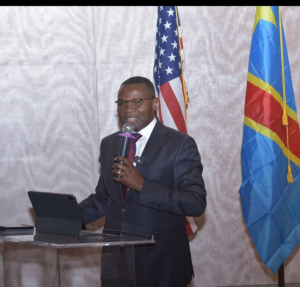Minister Julien Paluku Unveils Strategic the 4 Pillars of the Congo DRC Trade Policy
Minister Julien Paluku Unveils Strategic Trade Policy Focused on Diversification, Business Climate Reform, Export Promotion, and Economic Integration
Alongside the Minister of Communication and Media, H.E. Patrick Muyaya, Minister Paluku emphasized that the DRC is undergoing a period of reconstruction and renewal under the leadership of President Félix Tshisekedi. This transformation reflects the government’s determination to redefine the national economic framework.
“The first pillar of our trade policy is the diversification of the economy. We must no longer rely solely on the mining sector. By investing in agriculture and leveraging our vast arable land, we can create jobs and foster sustainable growth,” said Minister Paluku.
He stressed the urgent need to continue improving the business environment, noting that it currently takes around 200 hours to export a container from the DRC, compared to a regional average of just 50 hours. “Such inefficiency discourages investors. Streamlining export procedures is crucial to attract and retain economic operators,” he added.
The third pillar is export promotion. The Minister explained that while imports stood at USD 7 billion annually in 2019, exports have now grown to nearly USD 20 billion. “A balanced trade account is essential. Boosting exports will help bring in foreign exchange and strengthen our economy,” he emphasized.
Finally, Minister Paluku underlined the importance of economic integration, citing the DRC’s active participation in regional and international organizations such as SADC, ECCAS, the EAC, and the WTO. “Our engagement in these structures is vital to receive technical support and access global markets,” he concluded.
STRENGTHENING THE U.S.-DRC MINERAL PARTNERSHIP
Minister Paluku’s statement comes at a strategic moment, as the DRC prepares to finalize a landmark mineral agreement with the United States, aimed at securing supply chains for critical minerals such as cobalt, copper, and lithium—essential resources in the global energy transition.
The new trade policy’s focus on export efficiency and business transparency directly supports this growing partnership with the United States. By reducing logistical barriers, ensuring compliance with international standards, and deepening DRC’s involvement in global trade institutions, the government is laying the foundation for long-term, balanced trade relationships.
“With the right policies in place, this agreement with the United States could serve as a model for responsible sourcing and attract significant investment, technology, and infrastructure to the DRC,” said Dr. Ngoie Joel Nshisso, Consultant to the Foreign Trade Minister.
A STRATEGIC OPPORTUNITY FOR THE U.S. TO SUPPORT ECONOMIC REFORM AND MOBILIZE REFORMS
Beyond securing mineral supplies, the anticipated deal represents a strategic opportunity for the United States to support the Democratic Republic of the Congo's (DRC) ongoing economic reform efforts. By backing the government’s initiatives to strengthen governance, modernize trade procedures, and enhance the business climate, the U.S. can contribute to building a more stable, resilient, and inclusive Congolese economy.
In addition, the Congolese government formally invites the U.S. private sector to act promptly and seize investment opportunities in key sectors, including agriculture, energy, infrastructure, telecommunications, and green technology. The DRC offers vast growth potential, driven by its dynamic youth, abundant natural resources, and a clear political will to create a business-friendly environment.
“The partnership with the United States should not be limited to minerals. It must expand to a concrete commitment by the U.S. private sector to invest now in the real economy of the DRC,” Minister Paluku stated.
The trade strategy presented reflects the DRC’s ambition to reshape its commercial landscape and play a central role in global trade, at a time when its strategic minerals are more essential than ever to the world economy.
For inquiries, please contact:
The Consultant to the DRC Foreign Trade Minister
Dr Ngoie Joel Nshisso
Global Trade and Business Consulting
+1 704-910-7185
email us here
Legal Disclaimer:
EIN Presswire provides this news content "as is" without warranty of any kind. We do not accept any responsibility or liability for the accuracy, content, images, videos, licenses, completeness, legality, or reliability of the information contained in this article. If you have any complaints or copyright issues related to this article, kindly contact the author above.
San Francisco Dental Implant Center Announces New Content on Convenient Dental Implant Locations in SF
She Who Earns the Rose May Bear It: Sweet Briar Graduates 104 Seniors During 116th Commencement Ceremony
PlanChecker AI Launches with the Goal to Rewire the Infrastructure of Real Estate Development
Kalendarium
Więcej ważnych informacji
 Jedynka Newserii
Jedynka Newserii

 Jedynka Newserii
Jedynka Newserii

Motoryzacja

UE dąży do większej samodzielności w dostępie do surowców krytycznych. Częściowo pozyska je z recyklingu baterii
Zgodnie z aktem o surowcach krytycznych władze unijne dążą do zwiększenia niezależności w zakresie ich dostaw od Chin i innych krajów trzecich. Do 2030 roku ze źródeł zewnętrznych ma pochodzić nie więcej niż 65 proc. rocznego zużycia każdego z surowców. Z kolei 25 proc. ma pochodzić z recyklingu. – Te cele nie są nadambitne, bo recykling to relatywnie młoda część gospodarki, więc legislacja, która narzuca te poziomy odzysku i recyklingu to jedno, a realia to drugie – mówi Paweł Jarski, prezes zarządu Elemental Holding. Podkreśla jednak, że Europa ma duży potencjał w zwiększeniu odzysku i przetwarzania cennych surowców
Konsument
Konsumenci doceniają działania firm na rzecz środowiska i społeczeństwa. Dla przedsiębiorstw to szansa na rozwój

Zrównoważony rozwój staje się coraz ważniejszym elementem strategii biznesowych firm. Podmioty wdrażające długofalową strategię ESG mogą liczyć na korzyści finansowe, większe zainteresowanie inwestorów oraz poprawę klimatu i społecznej akceptacji. Spółki i przedsiębiorcy, którzy realizują inwestycje zgodnie z najwyższymi standardami środowiskowymi i społecznymi otrzymali Diamenty Zrównoważonej Gospodarki podczas konferencji Sustainable Economy Summit.
Edukacja
Poziom kompetencji cyfrowych Polaków na bardzo niskim poziomie. Spowalnia to cyfryzację gospodarki i firm

Na tle mieszkańców innych państw UE poziom kompetencji cyfrowych Polaków utrzymuje się na bardzo niskim poziomie – wynika z ostatnich danych Eurostat. Niecała połowa deklaruje posiadanie przynajmniej podstawowych umiejętności cyfrowych, a 20 proc. – więcej niż podstawowe. Staje to na drodze do cyfryzacji gospodarki i zwiększenia produktywności przedsiębiorstw.
Partner serwisu
Szkolenia

Akademia Newserii
Akademia Newserii to projekt, w ramach którego najlepsi polscy dziennikarze biznesowi, giełdowi oraz lifestylowi, a także szkoleniowcy z wieloletnim doświadczeniem dzielą się swoją wiedzą nt. pracy z mediami.









.gif)

 |
| |
| |
|